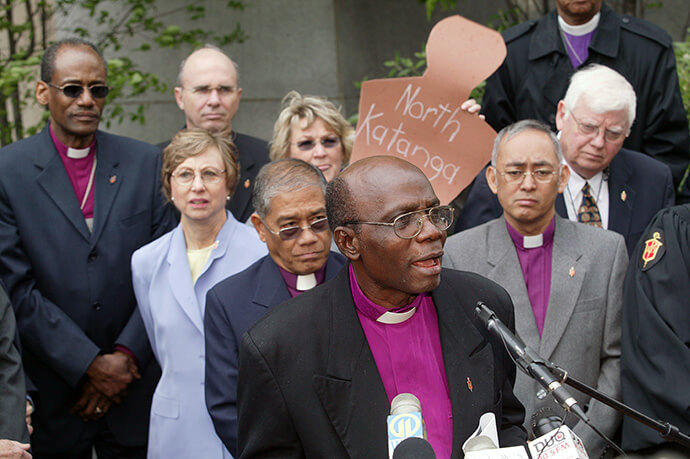Key points:
- Retired United Methodist Bishop Joseph C. Humper died last month at age 81.
- Bishop Humper served as chairperson of the Truth and Reconciliation Commission to help restore peace following civil war in his country.
- He served not only as a United Methodist episcopal leader, but also held several positions in ecumenical organizations.
- Colleagues said Humper was an influential mentor who developed clergy and lay leaders on the African continent.
Retired Bishop Joseph C. Humper of the Sierra Leone Conference, who died May 7 at age 81, is being remembered as an ecumenical and national leader who contributed to restoring peace following the civil strife in his country.
Humper held several leadership positions including president of the Council of Churches in Sierra Leone, president of the Inter-Religious Council of Sierra Leone and honorary president of the World Conference of Religion and Race.
He was elected to the episcopacy in 1992 by the West Africa Central Conference and was assigned to the Sierra Leone Area, where he served until his retirement in 2008.
“We not only mourn the passing of this great leader, but also celebrate and remember his faithful witness and service to our Lord and Savior, Jesus Christ,” said retired Bishops Arthur F. Kulah and John G. Innis and current resident Bishop Samuel Quire Jr. of Liberia in a statement.
Humper served the government of Sierra Leone in various capacities, including as chairman of the Truth and Reconciliation Commission, and was awarded Grand Command Order of the Rokel Sierra Leone, the country’s highest and most prestigious decoration awarded to recognize citizens who have distinguished themselves by making valuable contributions to the country in areas of public service, arts and sciences and philanthropy.
The Liberian bishops called Humper “an advocate for peace and justice” and noted his work on Sierra Leone’s Commission on Truth and Reconciliation beginning in 2002, “following the brutal civil war that took the lives of thousands of innocent people,” the statement said.
“For us, he was a devoted and well-respected servant leader of the global United Methodist Church. He was an encourager and a strong advocate for peace and justice for all of God’s children. We served respectfully and understandingly together on (the) Council of Bishops and the West Africa Central Conference in faith, hope and love.
“Thank you, Bishop Humper, not only for all you did for the mission and ministry of the church, but for all your contributions towards making Freetown and the country of Sierra Leone a place called a happy home,” said the Liberian bishops in their tribute.

Africa Colleges of Bishops President Eben K. Nhiwatiwa of Zimbabwe said Humper was one of the most jovial bishops he had ever known.
“I remember his readily smiling face. Bishop Humper was one of our seniors among the African bishops. We have been deprived of an advisor,” he said.
East Africa Episcopal Area Bishop Daniel Wandabula, who is also president of the Africa Central Conference college of bishops, said he will remember Humper as “a very fascinating and influential leader of his time.”
“He was a very dedicated and faithful servant leader who worked to develop other leaders, both clergy and laity. Humper assumed the episcopacy at a very challenging time when Sierra Leone was going through civil war. ... His faith and honesty helped him to effectively guide the Commission (on Truth and Reconciliation) to bring together victims and perpetrators in one room and in some cases lead to forgiveness and reconciliation,” Wandabula said.
Subscribe to our
e-newsletter
Humper was one of the leaders who encouraged Wandabula to trust God for an amicable solution to the impasse between the East Africa Episcopal Area and the United Methodist Board of Global Ministries and the General Council on Finance and Administration.
“I am very happy that at the time of his passing, this issue of the embargo had been resolved and relations between the East Africa Episcopal Area and Global Ministries had been restored.”
Bishop Humper’s higher education included certificates, diplomas and degrees from the Bible Training Institute at the then Bo Teacher’s College, Trinity College in Ghana, the University of Ghana, Fourah Bay College in Freetown, University of Sierra Leone, Union Theological Seminary in New York City, Garrett-Evangelical Theological Seminary in Evanston, Illinois, and Gbarnga School of Theology in Monrovia, Liberia.
Humper is survived by wife, Nancy Mamie Humper, and four children: James, Josephine, Joseph and Marvel. He was buried at Ascension Town Cemetery in Freetown, Sierra Leone.
In a Council of Bishops press release, Bishop Warner H. Brown, interim Bishop of the Sierra Leone Conference, expressed his heartfelt condolences to the bereaved family, members of The United Methodist Church and the people of Sierra Leone.
“(Bishop Humper) diligently led the church and passionately worked with world leaders to peacefully end the war in Sierra Leone and reintegrate its people,” Brown said.
Eveline Chikwanah is a United Methodist News correspondent based in Harare, Zimbabwe.
News media contact: Julie Dwyer at newsdesk@umnews.org. To read more United Methodist news, subscribe to the free daily or weekly Digests.




